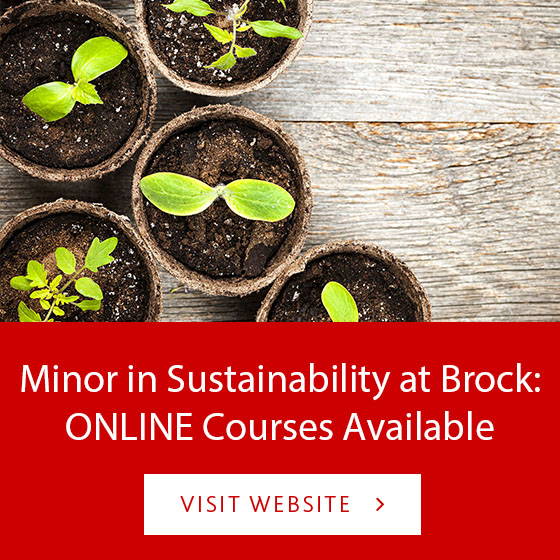Blog Contributor: Erica Harper

Christine Janzen is an instructor within the Environmental Sustainability Research Centre who teaches the Introduction to Environmental Sustainability (ENSU 2P01) and Environmental Sustainability in Practice (ENSU 2P02) courses at Brock University. Despite the challenges of teaching students in an online format during a global pandemic, she got creative and designed a case study for students focused on developing a sustainable community hub in the Town of Lincoln. A Community Hub is a place that offers various integrated services such as social, health, education, business development, and municipal services.
For context, the Town of Lincoln is in the heart of the Niagara Region on Lake Ontario and includes smaller communities such as Beamsville, Jordan, and Vineland. It is home to nearly 24,000 residents and to over 50 wineries, farms, and heritage sites. The Town of Lincoln has long been committed to creating a sustainable community for all, and their overarching vision to be a place where all residents grow, prosper, and belong. To continue to fulfill this vision, the Town has set to develop a sustainable Community Hub, which represents “Project 1” within the Brock-Lincoln Living Lab Sustainability Action Plan.
Students were challenged with the task of creating a planning process for the sustainable Community Hub while taking many other factors into account, such as:
- Determining who is involved in the planning process
- Assessing who should be consulted during the planning process
- Securing a building in an accessible location
- Creating a framework for the project
- Return on investment
- The services that will be offered to residents
- Implementing sustainable initiatives and making sustainability a priority
- Ensuring that all residents are informed and buy into the idea of a Community Hub since taxpayer money will help to fund this project
To help inform their responses to the case study for the Town of Lincoln, students were presented with fictional quotes from various key stakeholders that were “asked whether or not they would support the implementation of a Community Hub in their town”. Some fictional stakeholders included the Mayor, the Manager of Infrastructure and Development, citizens, council members, business owners, and social service providers.
According to Janzen, the students approached this project and their chosen topics with a variety of interesting ideas. For example, a group of students were tasked with focusing on green infrastructure and low impact design on the community hub property. Their ideas ranged from a green roof, rain gardens, and permeable pavement to allotment of land for community gardens. Another group was asked to propose a communication strategy to promote the Hub to a group of stakeholders who may be hesitant about its implementation where they could apply what they’d learned about best practices in Environmental Communications. This group of students considered what messages would resonate best with the stakeholders they’d chosen based on their values and concerns, and considered best methods of dissemination of messages from in-person group discussions, public participation through social media, local broadcast media to forming a local community hub committee including some of the Town’s citizens.
Overall, Janzen said that while the steps of this project were new to many students and that the project was challenging, the students rose to the occasion. Janzen also said that she was “pleased to see students using what they had learned about the Town’s values, goals, and objectives to help them determine what voices would be important in the Hub discussion”, adding that “one student even mentioned that she drove through the Town of Lincoln for the first time to get a better idea of the context of the case study”. She also focused on the importance of experiential education, as it “gives students opportunities to see how theory is applied in the “real” world and deepens their understanding of the course material”.
Experiential education also helps students make connections between theory and practice at a local level. “For example”, said Janzen, “ENSU 2P02 explores how environmental sustainability practices are being implemented in several fields and provides examples from across the globe. Having students work through one of the projects the ESRC is engaged in allows them to see and participate in a project that is happening locally – what sustainability looks like in Niagara Region”.
